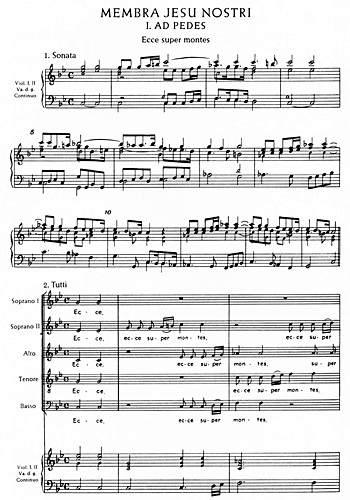Buxtehude's masterpiece

Buxtehude’s Membra Jesu Nostri is a cycle of seven cantatas based on a medieval Latin poem ‘Salve mundi salutare’ by Arnold of Louvain (d. 1250). The poem is itself divided into seven parts, each devoted to one of the members of Christ’s crucified body: feet, knees, hands, side, breast, heart, and head. This form clearly provides the structure of Buxtehude’s work, which furthermore is unique in his oeuvre as a cycle of seven related cantatas.
Each cantata follows the same basic design, though with some internal variation that neatly prevents any sense of rigidity overall. In each cantata Buxtehude selects three strophes from each section of the medieval poem, and these are sung as a group of three arias, punctuated with instrumental ritornellos, forming the central section of each cantata. This is framed by an opening sonata introducing a ‘concerto’ for voices and instruments, which is then normally repeated to conclude the cantata. For the ‘concerto’ Buxtehude uses a short Biblical text, related to the cantata’s theme.
It is in the last two cantatas that certain intensifications of affect are most evident, heightening the expressive significance of heart and head. The 6th cantata uses violas da gamba and calls for tremolo playing (not a modern tremolo, but repetitions of the same pitch under a single stroke of the bow); in the 7th cantata the third aria is sung tutti and is followed by a concertato Amen rather than a repetition of the opening.
We do not know the occasion for which Buxtehude composed this work. It seems unlikely to have been conceived for his famous Abendmusik concerts (though one can certainly imagine individual cantatas being given there), and perhaps it was originally intended for a more dedicated occasion such as a Good Friday service, where the cantatas might have been interspersed with spoken elements such as prayers, Biblical readings, and sermons.
The work was dedicated in 1680 to “a foremost man, Gustav Düben, most noble and honoured friend, Director of Music to His Most Serene Majesty the King of Sweden.”
Thanks to:
Ars Nova Copenhagen is supported by Statens Kunstråd, Det Obelske Familiefond, Dansk Korforbund, Københavns Kommune, Augustinus Fonden, Dronning Margrethes og Prins Henriks Fond, Knud Højgårds Fond, Oticon Fonden, Toyota Fonden Wilhelm Hansen Fonden, Københavns Musikudvalg og Carl Nielsen Fonde.
Diderik Buxtehude (d. 1707) Membra Jesu Nostri

